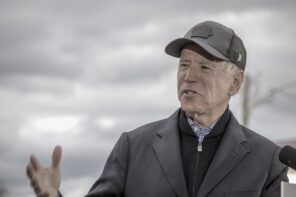Several friends e-mailed me overnight to draw my attention to Joe Nocera’s column in the New York Times, “The Tea Party’s War on America,” which opens as follows:
These last few months, much of the country has watched in horror as the Tea Party Republicans have waged jihad on the American people. Their intransigent demands for deep spending cuts, coupled with their almost gleeful willingness to destroy one of America’s most invaluable assets, its full faith and credit, were incredibly irresponsible.
Thank you, Joe Nocera. By labeling the Tea Party’s agenda a “jihad,” Nocera has undone years of effort. My effort. The effort of so many Muslims, so many fair-minded observers, experts, thinkers and leaders, who rarely get the kind of platform that Nocera enjoys here, and who would never have access to it consistently.
Like you, like Nocera, I’m horrified by what just happened by way of “compromise.” If you could see me, I have that hangdog look we’ve seen on Sen. Harry Reid over the last twenty-four hours, a sense of crushing existential weight that not even his mighty majoritarian shoulders can bear. Oh, and Ramadan Mubarak!
Nocera’s use of “jihad” is consistent with the use of the term by the extremists who have perverted Islam, who have so manipulated its very language, its most sacred terms, as to make them entirely unpalatable, worthy of a broadcast television bleep, and I for one am fed up both with that, and with the lazy acceptance of such abuse by the same individuals who’d probably ask why Muslims don’t do more to fight the misappropriation of their religion.
A local Muslim leader can deliver a sermon on what jihad really is, write an op-ed in a regional newspaper, and organize some kind of lecture or event series which rejects the extremist abuse of Islam and explains how their abuse of Islam is flawed, immoral, and historically and theologically wrong. Misguided. Evil.
And then, a columnist in an international newspaper makes a throwaway reference to “jihad” in the sense that extremists have used it, confirms the popular impression of what jihad is and what it means, and all that effort is immediately undone. Time to start over again.
People always ask me why American Muslims don’t do more to condemn terrorism. The real question is: Why can’t anyone hear us? Perhaps the same people should ask why a minority of Tea Party representatives were able to push for a so-called compromise which leaves the Democrats looking pathetic, wearied and defeated, even after mainstream capitalist thinkers insisted that America was not going to default on its debt.
Not only that, everyone in the world needed a safe haven for their capital and their profit. The theme was common: Focus on growth, increase spending, and then start cutting when the economy’s back on its feet again. And by economy, I mean the overwhelming majority of us, who cannot weather more than a few weeks without our regular sources of income. The Tea Party, by snarling Washington into a disgusting display of partisanship, created the doubt in the American economy’s long-term viability that they themselves initially claimed to set out to fix.
But the mainstream media rarely reports what people think and feel, and more often than not, reflects skewed priorities—those of the rich, and not just the rich, but the very, very rich. How convenient that we have saved America’s economy without costing the very, very rich any more in taxes—but the overwhelming majority of Americans, already squeezed, will be squeezed just that much harder. And I suppose this is all just a quaint coincidence.
And why don’t we wonder about that a little bit more?
Nocera’s use of the term “jihad” returns us to the theme that violence is foreign. The greatest danger to America is from outside. In the same way that so-called experts like Jeffrey Goldberg and Pamela Geller immediately blamed Muslims for the Norway attacks, even in the first minutes after the attack, when absolutely no evidence was available as to who was responsible (that’s not all Geller did).
Millions of American Muslims go about their lives in entirely normal ways, and the actions of a few, amplified by media platforms and irresponsible journalists, obscure that reality. Then Joe Nocera tries to compare Tea Party radicals to Islamic radicals, as if this makes the comparison more powerful—and his analysis more insightful.
But the Tea Party is not foreign; it is homegrown.
Don’t make this foreign. Don’t end with a casual reference to “suicide vests,” as if by making the Tea Party seem Muslim or Arab, they are therefore easier to disparage.
Don’t pin this on Muslims, however subtle you think you are being. The effect of such words is greater than you think. And the refusal to attend to the deeper issue is the real problem.
The right thing to do is face this head on, and ask why it has come out of America today, and what it is about America today that leads people to accept a narrative of economics presented by those who recently ruined our economy. Why is it that we have not only no short-term memory, but no memory at all? We must have the courage to ask questions about why the Tea Party’s agenda is so capable of capturing the media’s attention, and how it is that the party which controls the Senate and the White House was forced—or otherwise compelled—to give in, to make an economic desert, and call it a compromise.




